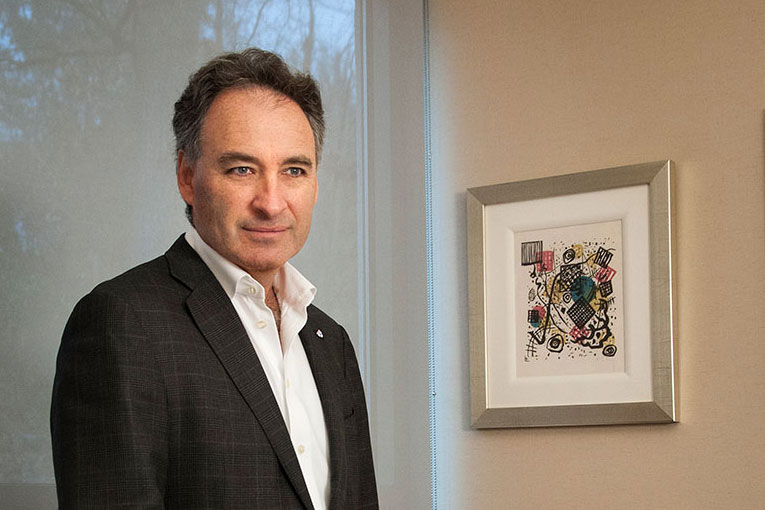HMTX Industries is laying the groundwork for positive change across the world of flooring.
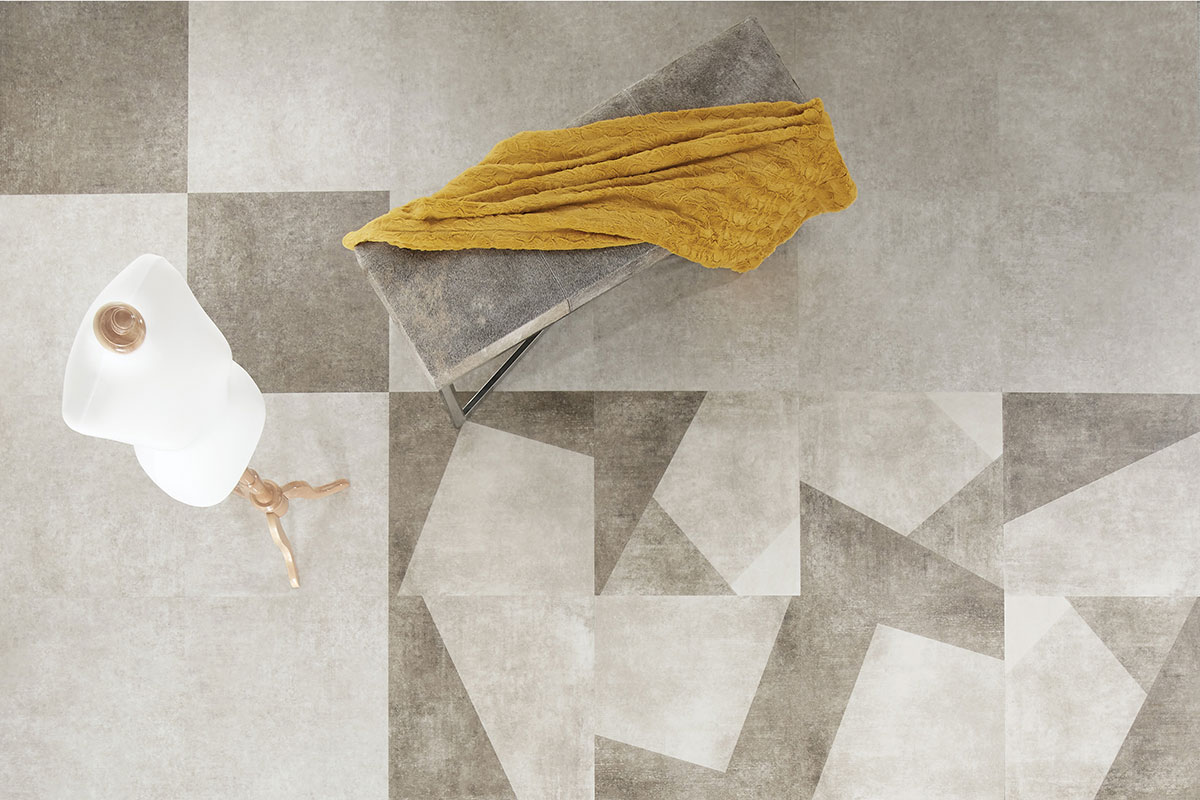
Courtesy of HMTX
The year 2019 was eventful for the HMTX Industries family of companies, as it brought Halstead, Metroflor, Teknoflor, Aspecta, and Vertex together under one umbrella. As the flooring industry itself is ever-changing, the time has come to stand up and call attention to the work being done, according to Harlan Stone, CEO of HMTX Industries and a longtime innovator in the arena of luxury vinyl tile (LVT).
“This was a chance for us to take a leap forward,” Stone says of the 2019 announcement. “I grew up in a family business where you kept your head down. With this incredible rise of LVT and the innovation happening in our space, you can’t do that anymore. It’s time to get up and shout about what you do.”
Stone says the industry in general is in a disruptive state, but he sees that as a chance for greatness. “You have two choices when you confront this kind of disruption and change. One is to become scared, and the other is to recognize there is opportunity in change. I’ve chosen the second path. The more people choose the second path, the more likely we are to advance the industry.” To those feeling scared or uncertain, or who are upset about tariffs and worried about the economy, he advises them to look for opportunities. “That’s what’s going to drive us forward. When people ask me my biggest competitor, I say my biggest competitor is big screen TVs, video games, and people wasting their money buying new cell phones. I want share of wallet, not share of market.”
We recently sat down with Stone to find out more about what’s next for the company and the industry at large.
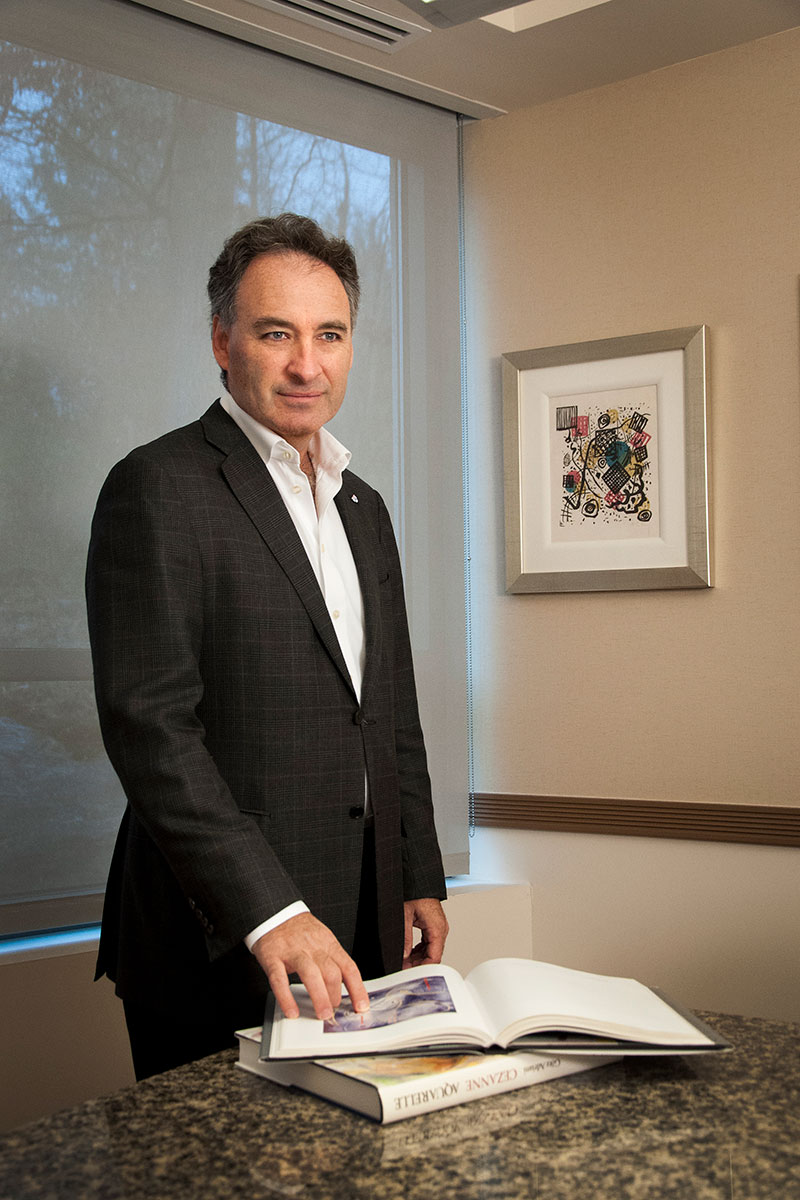
Courtesy of HMTX
How does having this single business entity strengthen what you’ve already been doing?
We consider our divisions towers. And our towers are supported by three pillars. The three pillars include design excellence—we believe design leadership is critical and we have some very exciting things we’re working on in that area. In 2020 we’re going to take some leaps forward with a new view of how important design is to our industry. Then there’s supply chain superiority—supply chain to us is a foundational issue, not only supply chain in terms of sourcing and working with China but also supply chain in terms of how you move product, how you do that efficiently, and how you utilize best practices to deliver products on time, affordable, and with a low environmental and carbon impact. These are all important to us, and this is also important to consumers. Supply chain is one of the critical business operations that’s a result of what we refer to as the Amazon nation of our nation. Amazon is changing the story, and if you don’t have supply chain as a fundamental core value you’re investing in, you’re not ready for the 21st century.
The third pillar is the one we’re most proud of is, which is what we have renamed our STIQ Initiative—sustainability, transparency, innovation, and quality. It used to be quality first; we have reversed the conundrum there and we are saying sustainability and transparency first. We believe that resonates with the design community. We believe that resonates with millennial shoppers. And we believe sustainability and transparency leads to good quality and the ability to be innovative. The era of being secretive is over. You need to empower the consumer, whether that consumer is an individual homeowner, engineer, designer, or architect; you need to empower them with the knowledge to make the right decision.
How does this benefit HMTX, and how does it affect the industry?
The direct benefit is opening new markets. Flooring traditionally is a conservative industry. We’re trying to make flooring important, make it a critical part of your project, your home, a critical and large expenditure. When you buy flooring for your house it’s one of the most expensive things you’re going to do. The same is true for retail settings, hospitality, and even corporate. This should be something people embrace as part of their personality, part of their corporate culture. We’re trying to open new avenues for people to care about flooring instead of looking at it as something like painting walls.
We’re definitely seeing the benefits. Teknoflor has a lot of new products in the marketplace. With the chlorine-free product they now have with the Living Product Certified Naturescapes HPD (the brand’s first luxury organic sheet good made from organically derived polyurethane processed from castor oil), they’re opening a lot of new markets on the West Coast in the health care marketplace. With Halstead we’ve changed the story with consumers who are really embracing a lot of the new things we’re doing that were once considered too expensive for residential consumption. We’ve upped the game.
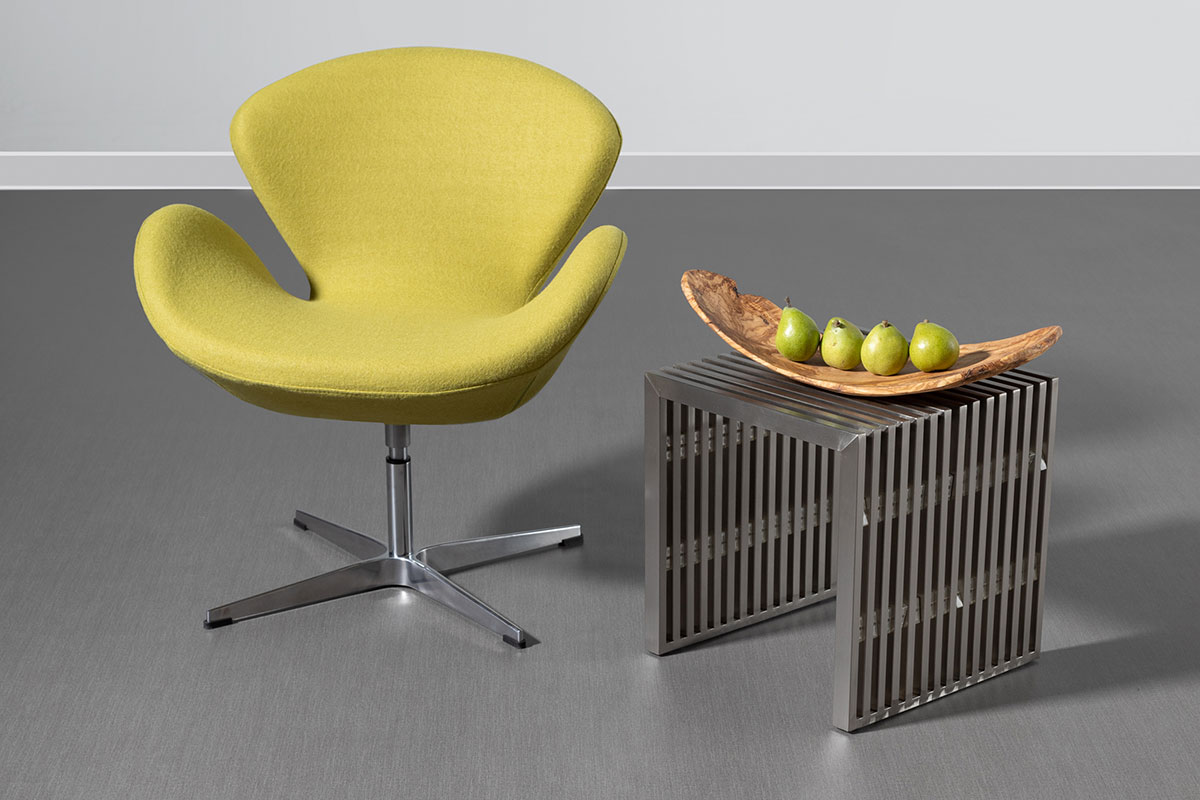
Teknoflor’s Naturescapes HPD is chlorine-free and comes in 24 designs in three styles.
Courtesy of HMTX
What’s the biggest challenge facing the industry today?
The biggest challenge is deferred investment in flooring because of the looming recession—people deciding they can live with their existing flooring with no need to make a change; they let it get worn out, get uglier and less effective to live on, and that’s bad. It’s bad for the industry and it’s bad for the people who aren’t investing in upgrading that part of their life.
Do people just not find flooring exciting?
That’s exactly the opportunity. The opportunity on the other end of that risk is to get people excited about their floors again. I’ve learned a lot from the International Living Future Institute leadership about biophilia—you need to feel good about your built space. It’s part of your psychological and emotional wellness. If you live in a dilapidated place you can’t keep clean and your kids aren’t happy and they don’t want their friends to come over, this is something we need to get people excited about, to make them say, “I’m happy in my home. I’m happy in my place of work. I’ve got more customers coming in because I have a new look that’s fresh and fun.”
I do a lot of philanthropy work in housing and in surfacing in underserved communities, and one of the biggest differences in successful kids growing up is how they live. If you live in a place that is depressing you will be at a big disadvantage. I’m not saying you won’t be successful, but you will be at a big disadvantage. When you grow up in a house your mother is proud of, that is fun and makes you feel great when you get home, you do your homework, you have your friends over, and you have a better life. We all need to remember the importance of built spaces on children’s development and quality of life.
We go to the Carter Build every year with Habitat for Humanity. I’m bringing about 45 of my staff to the build. We donated all of the flooring for the third year in a row, and I’ve been on my hands and knees installing the flooring in people’s homes. I can’t tell you the pride I feel when they say how much happier they are having a home with our flooring. It’s really important to remember the purpose of what we do.
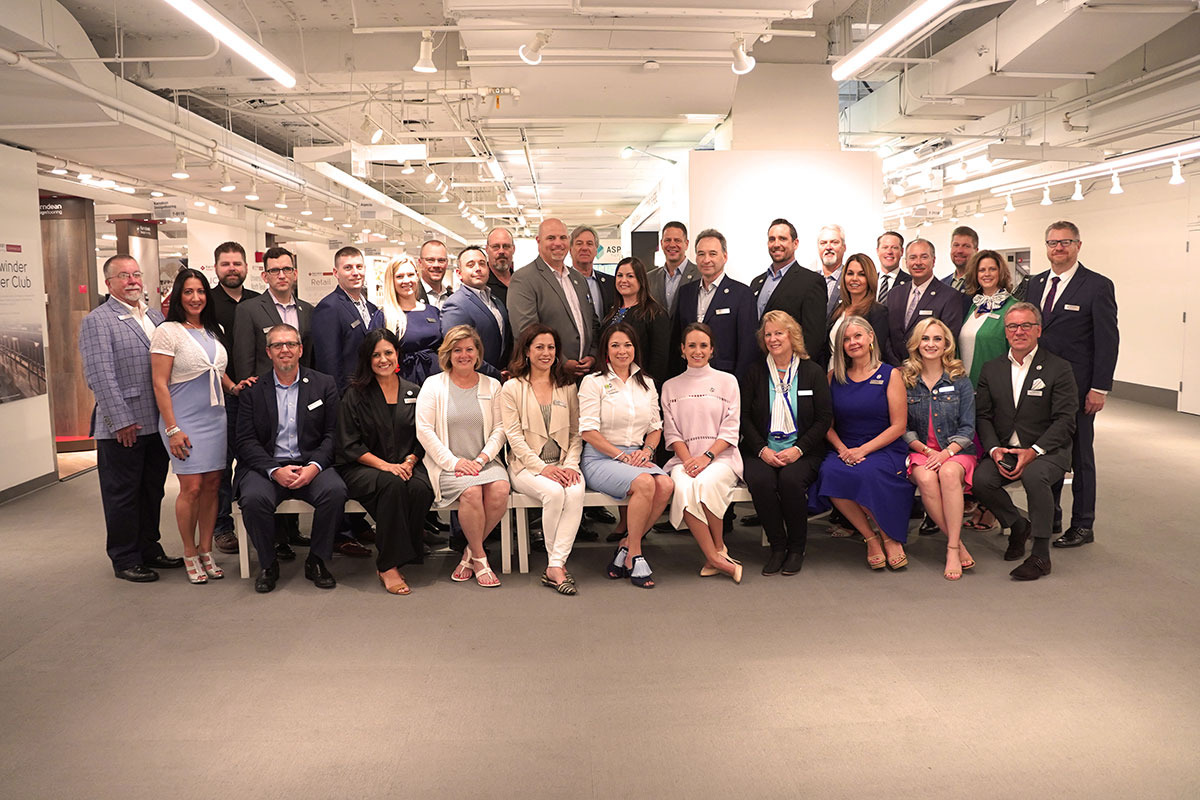
Courtesy of HMTX
You’ve made great strides around manufacturing in China, too, including working with two Chinese factories to achieve the JUST social justice label—a first for any company in Asia. What’s it been like working in China?
There have never been more challenging times than there are today. Needless to say the tariffs are affecting everybody in the supply chain for the category of LVT. China is certainly being affected by this trade war, so the need for people in China to be responsive and the need for people in consuming countries—America, Canada, Europe, et cetera—to understand what’s happening in China is critical. It’s not us against them. We want to make sure people understand that the workers and the owners and managers in China are human beings who are working hard for their families and to be successful. There are hardworking people in every country and let’s expose good behavior where it is and punish bad behavior where it’s been. It’s not a cultural thing. I’m very afraid of xenophobia.
What’s been most exciting for you in your career in general?
I’ve worked in this industry since I graduated from college. I’m a simple guy, and I’ve had a pretty straightforward career, but I’ve gone from a very small enterprise to a very large enterprise and that took a lot of hard work and a reasonable amount of luck—you have to be lucky in this business, too. But as they say, luck is just realizing an opportunity is there and grabbing it. Everybody has a moment. I never thought LVT would become the leading growth instrument for the global flooring industry. That was a surprise. I was in the right place at the right time, but I also feel I’ve had some effect to make that happen by being a driving force for innovation in the category.
You have to be bold if you want to be a leader. You have to take risks, and you have to work really hard and be willing to make mistakes and to really learn from your mistakes. You have to look at them as opportunities and become better. I’ve had my ups and downs. Though the challenges have been great, I feel happy to be in the position I am.
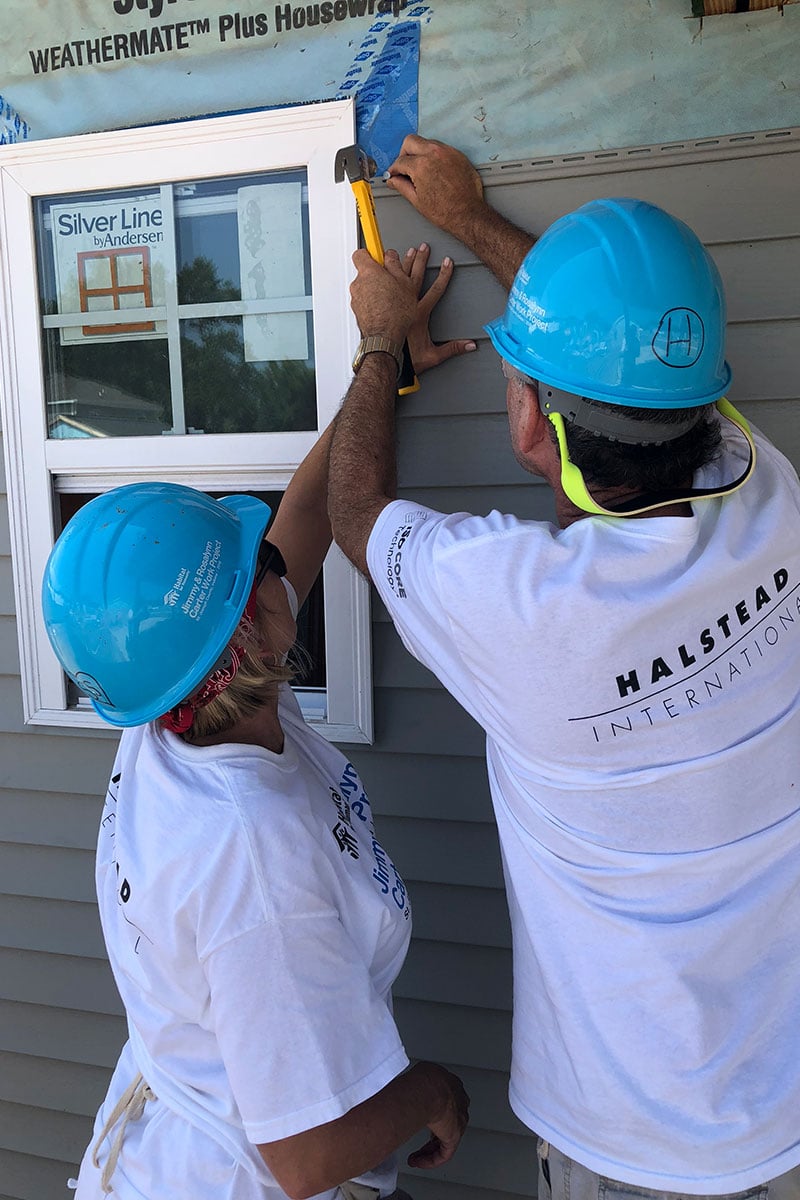
Courtesy of HMTX
What are a few lessons you’ve learned when it comes to leadership?
Never underestimate the person who’s buying your floor. Don’t talk down to and don’t think for them. Give them the best product you can with the richest story and features and try to anticipate the problems they may have so you can improve. If you think like the customer and with respect of the customer your chance of success is much greater. That’s the lesson that’s the easiest to lose sight of as you get bigger. You start thinking about running your enterprise and you stop thinking about the product. I try to stay attached to the customer experience.
How do you stay connected to the customer on a real level?
Besides working Habitat for Humanity, I spend a lot of time talking to my employees who are more in touch with the day-to-day customer. I just had a town hall in my Calhoun, Georgia campus. I told senior management to go home and I worked with our hourly employees, saying, “Tell me what we need to do as a company and what I as a leader need to do better to make your jobs more effective.” It was a fantastic session. I learned a lot and made a lot of smart decisions after that meeting. I also feel I’m very lucky to have a powerful and customer-focused retail chain customer, Home Depot. They never let us forget the customer is first.
Any secrets you can share when it comes to building the best team?
As the CEO recruiting is one of your number one jobs. The number one job is cheerleading, but one of the top jobs is recruiting. I try to hire people smarter than me. This is an act of humility, but I want to be surrounded by people who are smarter than me. I don’t want to say I’m the smartest guy in the room, I want to be surrounded by people who have thoughts that go beyond my own. I’ve recruited from throughout the industry and outside the industry and I’m extremely proud of my leadership team.
You want people to challenge you. Poor organizations have “yes men” answering to a dictatorial leader. I want smart people who challenge me, and I want to listen and be able to pivot. Pivoting is critical to great leadership. In both recruiting and leadership you need compassion, you need empathy, and you need to be human. Don’t act like a god. Act like a person. You need to be among the people, not above the people. That’s important. It’s easy to become infatuated with success, but staying humble is a critical path to success.

